Six Students Awarded NSF Graduate Research Fellowships
The five-year fellowship is awarded to outstanding students pursuing a graduate degree in STEM
Northwestern Engineering PhD students Mandi Cai, Melissa Chen, Lawrence Chillrud, Fiona Neylon, and Essien Taylor, and undergraduate student Carolyn Zou in Northwestern’s School of Communication, have been awarded National Science Foundation (NSF) Graduate Research Fellowships in recognition of their demonstrated potential for significant research achievements.
The highly selective Graduate Research Fellowship program awards a five-year fellowship to outstanding individuals pursuing a full-time, research-based graduate degree in science, technology, engineering, and mathematics (STEM) disciplines. The students will receive three years of financial support, including an annual stipend.
Mandi Cai
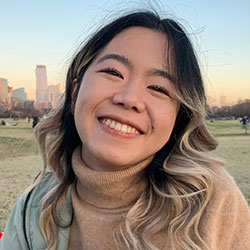 Cai is a second-year PhD student in Northwestern’s Technology and Social Behavior program (TSB). A member of the Midwest Uncertainty Collective (MU Collective), Cai is advised by Matthew Kay, an associate professor of computer science at the McCormick School of Engineering and of communication studies at Northwestern’s School of Communication.
Cai is a second-year PhD student in Northwestern’s Technology and Social Behavior program (TSB). A member of the Midwest Uncertainty Collective (MU Collective), Cai is advised by Matthew Kay, an associate professor of computer science at the McCormick School of Engineering and of communication studies at Northwestern’s School of Communication.
Prior to joining Northwestern, Cai was a data journalist at The Texas Tribune. Her award-winning work with editors Darla Cameron and Chris Essig inspired Cai’s curiosity about data visualizations in the media and shaped her current research focus.
“This fellowship provides me with the support to investigate all the big, pressing questions I had while working as a data journalist — ‘how is data journalism supporting the public’s ability to understand and interact with data, data visualizations, and statistical models in news coverage around high-profile topics like COVID-19 and elections? How do audiences understand and trust this coverage?’” Cai said.
Leading up to the November elections, she is investigating public perceptions around the use of data and statistical modeling in elections coverage, with a particular focus on the communication of live election results and winner projections. Cai and her collaborators — Kay and Erik Nisbet, Owen L. Coon Endowed Professor of Policy Analysis, and Communication — aim to determine participants’ baseline level of understanding, points of confusion, and degree of distrust toward winner projections in US elections. Using this data, the team will design and test alternative explanations of projections to improve user understanding and synthesize techniques for newsrooms to effectively communicate data-driven models.
“Ultimately, I wish to empower data journalists to be data educators who can consider the unique needs of their reader populations,” Cai said. “I also seek to empower readers to understand data they encounter in everyday life. More public data and statistical literacy supports individuals in evaluating and interrogating data as it is used to guide decisions or fuel algorithms.”
Melissa Chen
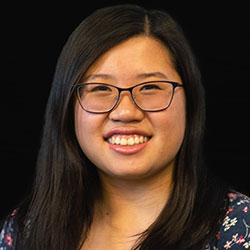 Chen, a second-year PhD student in computer science and member of the Delta Lab, is advised by Eleanor O'Rourke, an assistant professor of computer science at Northwestern Engineering and of learning sciences in the School of Education and Social Policy.
Chen, a second-year PhD student in computer science and member of the Delta Lab, is advised by Eleanor O'Rourke, an assistant professor of computer science at Northwestern Engineering and of learning sciences in the School of Education and Social Policy.
Chen studies students’ self-efficacy — or a person's belief in their ability to complete a task or achieve a goal — in introductory computing courses.
Building on research by O’Rourke and Jamie Gorson (PhD ’22), a graduate of the joint PhD program in Computer Science and Learning Sciences, Chen is examining students’ self-assessments during the process of learning programming and the tendency for novice programming students to be self-critical. Chen wants to understand how students with lower self-efficacy are influenced by personal experiences and interactions with the computing community and aims to design scalable systems that help students adjust their self-assessment criteria to be more aligned with what is expected of them as computing learners.
“Self-efficacy has an impact on students’ decisions to persist in computing,” Chen said. “By gaining a better understanding of how to improve and build self-efficacy, I hope to be able to equitably support students so that they feel confident learning and using their computing skills in their everyday lives.”
Supported by a 2023-24 Design Cluster research fellowship, Chen is also working on a related project with O’Rourke and Duri Long, assistant professor of communication studies in the School of Communication and (by courtesy) assistant professor of computer science at Northwestern Engineering. The team is designing a socially situated, small-group intervention to help students reframe their self-assessments and improve their self-efficacy. They plan to work with students to determine how to make the interventions scalable.
Lawrence Chillrud
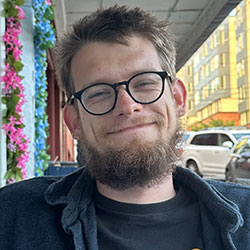 Chillrud, a second-year PhD student in electrical engineering at the McCormick School of Engineering, is a member of Aggelos Katsaggelos's Image and Video Processing Lab and co-adviser Lee Cooper’s Computational and Integrative Pathology Group.
Chillrud, a second-year PhD student in electrical engineering at the McCormick School of Engineering, is a member of Aggelos Katsaggelos's Image and Video Processing Lab and co-adviser Lee Cooper’s Computational and Integrative Pathology Group.
Chillrud is developing machine learning methods for applications in biomedical imaging. He aims to create robust uncertainty quantification techniques for medical imaging models and to design reliable algorithms that can assist doctors and patients in making informed decisions.
“Knowing when to trust these complex predictive models in high-stakes clinical settings is of critical importance,” Chillrud said. “If a model could reliably estimate its case-by-case uncertainty, clinicians could have a better understanding of how to integrate model predictions in data-driven decision-making, and patients could be better informed and in control of their disease and treatment plan.”
Chillrud is working on two research projects. In his radiological work, he is developing models that seek to predict the presence or absence of important brain tumor biomarkers in a patient’s MRI scan. In pathology, Chillrud is investigating computational techniques to help renal pathologists identify patients most at risk of kidney transplant failure.
Chillrud earned a bachelor’s degree in computer science from Columbia University in 2020. Prior to joining Northwestern, Chillrud was a senior programmer in the Department of Environmental Health Sciences at Columbia University’s Mailman School of Public Health. His research into the development of interpretable machine learning methods for assessing complex mixtures of environmental exposures in epidemiological studies with mentor Marianthi-Anna Kioumourtzoglou ignited Chillrud’s passion for research and inspired him to pursue a PhD.
“I feel tremendously lucky to have been awarded the fellowship and believe that it speaks more to the exceptional support and mentorship I have received over the years from advisers, colleagues, teachers, friends, and family, than it does say anything about me personally,” Chillrud said. “I am also hugely grateful to the NSF for their support during this early and exciting stage of my career.
Katsaggelos is the Joseph Cummings Professor of Electrical and Computer Engineering and (by courtesy) professor of computer Science at Northwestern Engineering and professor of radiology at Northwestern’s Feinberg School of Medicine. Cooper is the director of the Institute for Artificial Intelligence in Medicine’s Center for Computational Imaging and Signal Analytics in Medicine and associate professor of pathology and preventive medicine at Feinberg and (by courtesy) associate professor of electrical and computer engineering.
Fiona Neylon
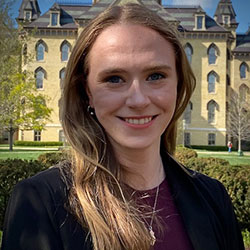 A member of the Center for Robotics and Biosystems, Neylon is a second-year PhD student in mechanical engineering advised by Brenna Argall, associate professor of computer science and of mechanical engineering at Northwestern Engineering, and associate professor of physical medicine and rehabilitation at Northwestern University’s Feinberg School of Medicine.
A member of the Center for Robotics and Biosystems, Neylon is a second-year PhD student in mechanical engineering advised by Brenna Argall, associate professor of computer science and of mechanical engineering at Northwestern Engineering, and associate professor of physical medicine and rehabilitation at Northwestern University’s Feinberg School of Medicine.
Neylon’s research interests lie in human-robot interaction in the medical, rehabilitation, and assistive spheres. Drawing from her own prolonged rehabilitation experience during high school after a near-total spinal fusion, she aims to develop tools that clinicians and patients can use to improve overall quality of life.
“Having normal function one day and limited the next made me understand the importance of independence and improving the quality of life for all,” Neylon said. “I’m thankful for being in the unique position of pairing that experience with my technical training to make me the researcher I am today — one motivated to improve the lives of individuals through robotic and assistive solutions.”
After joining Argall’s Assistive and Rehabilitation Robotics Laboratory (argallab) at the Shirley Ryan AbilityLab in 2022, Neylon began working with the argallab’s assistive robotic arm project team on developing a body-machine interface for customized control. The group is studying the learning effects of individuals with spinal cord injuries to control a seven-degree-of-freedom robotic arm via a shared control training paradigm.
“Receiving the fellowship is an incredible honor and is not only validation of the dedication I’ve put into my academic and research pursuits, but also a testament to the support of my mentors,” Neylon said.
Essien Taylor
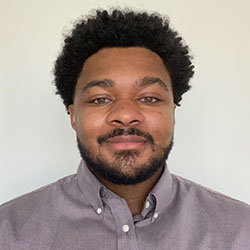 Taylor, a second-year PhD student in computer engineering in the Power and Reliability Aware Architecture Lab, is advised by Russell Joseph, associate professor of electrical and computer engineering and of computer science at Northwestern Engineering.
Taylor, a second-year PhD student in computer engineering in the Power and Reliability Aware Architecture Lab, is advised by Russell Joseph, associate professor of electrical and computer engineering and of computer science at Northwestern Engineering.
Taylor investigates computer architecture and aims to reduce energy consumption in power-constrained embedded systems, including electronic medical implants and mobile phones.
“Understanding the energy consumption of microprocessors requires detailed models that take a large amount of time and labor to create,” Taylor said. “My current work will generate these complex models in a fraction of the time and effort, allowing us to rapidly explore countless research avenues.”
In 2023, the financial support of his GEM Fellowship afforded Taylor the opportunity to intern with Cadence Design Systems Inc., which aided his approach to electronics design.
Taylor is also a member of the Karsh STEM Scholars Program at Howard University, where he earned a bachelor’s degree in computer engineering. The program provides full scholarships for undergraduate students in science, technology, engineering, and mathematics disciplines and support for underrepresented minorities completing graduate programs in STEM.
“My experience as a Karsh STEM Scholar at Howard University was crucial in developing my passion for research,” Taylor said.
Carolyn Zou
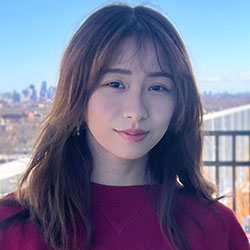 Zou is a fourth-year student in communication studies in Northwestern’s School of Communication with a concentration in computer science. Advised by associate professor of communication studies Aaron Shaw, Zou is a member of the Community Data Science Collective, an interdisciplinary, multi-institution research group applying a range of quantitative and qualitative methods to the study of online communities.
Zou is a fourth-year student in communication studies in Northwestern’s School of Communication with a concentration in computer science. Advised by associate professor of communication studies Aaron Shaw, Zou is a member of the Community Data Science Collective, an interdisciplinary, multi-institution research group applying a range of quantitative and qualitative methods to the study of online communities.
Zou builds AI tools that support the design of resilient social systems. Leveraging generative language models, her goal is to create ‘agents’ that faithfully represent the people that populate complex social systems.
“Simulations with these agents can reflect the contingent dynamics of social influence and interaction, and prototyping with populated systems allows decision-makers to assess the anticipated effects of, and iterate on, prosocial interventions,” Zou said.
This fall, Zou will join the PhD program in computer science at Stanford University, supported by both the NSF Graduate Research Fellowship and a Stanford Graduate Fellowship.
"I am immensely grateful for the NSF's support as I begin my graduate studies. This recognition is a testament to the incredible mentorship I've received at Northwestern and truly speaks to the opportunities afforded by the wide reach of human-computer interaction research across the University,” Zou said. “Northwestern's interdisciplinary environment allowed me to pursue HCI research from a starting point in the social sciences while developing the technical skills to prepare me for a PhD in computer science, and I look forward to bringing this unique perspective to my future work in human-AI interaction."
